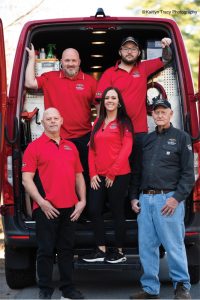
By Susan Elise Campbell
Compact heat pump systems are gaining popularity in the northeast as manufacturers make them increasingly efficient, and efficiency means savings on rising energy costs, said Ron LaDue, a BPI certified estimator and project manager with Jack Hall Plumbing and Heating. The family-owned company dates back to 1984 and is based in Glens Falls.
LaDue said about 20 percent of business involves the sale, installation and service of split heat pump systems for new construction, home renovations, and commercial buildings. But that percentage is “slowly increasing.”
“Five years ago very few brands of these systems ran efficiently, as far as capacity of the unit and energy usage,” he said.
Mini split systems involve wall units in selected rooms, which serve as heating and cooling zones, LaDue said. They make minimal noise and operate with a remote or smart phone.
Heat pumps pull heat from outside air to warm a residence and cold air to cool it. The system involves one or more exterior pumps that operate on electricity and have been especially efficient where weather is not extremely cold.
“Technology is getting to the point where the units are more suitable for single-digit temperatures and below,” said LaDue. “Every major brand today can run at -13 degrees and some claim as low as -22 degrees.”
“At these temperatures, heat pumps will provide 60 percent of their advertised capacity, which make them viable in areas like Scroon Lake,” he said.
If there are only a few negative double-digit days a year, oversizing the unit could cover those days, but up-front costs would be higher, he said.
“Some days there literally isn’t enough heat for the units to pull inside,” said LaDue. “The coil in the unit begins to ice up and the system shuts down. Modern technology allows them to defrost themselves, but at a certain point they cannot defrost fast enough.”
“Customers on the lake have accessories installed that protect the fan and coils from wind and snow,” he said. “But if temperatures sustain the negative twenties, the equipment will shut off until it is warm enough to come back on.”
Homeowners need a secondary heat source like a pellet stove or fireplace when the pump cannot, he said.
No such issues when it comes to cooling in summer. Split systems are more efficient than central air and thus cheaper to run.
Most customers are retrofitting an older home, LaDue said. Their numbers are growing, and the market is changing.
Next year all new residential construction in New York must be specced for a geothermal or heat pump system, he said. Lawmakers are eliminating oil, natural gas, and propane heat and appliances for home use.
“You’ll be seeing more houses with mini split systems, which are an easy installation for a smaller house,” said LaDue. “Homes more than 1,200 square feet need more than one pump.”
“A popular option now is a heat pump that uses the same outside unit as a mini split. It connects to an indoor air handler similar to a furnace, but is all electric,” he said.
LaDue said legislative change will nearly double the cost of new HVAC. But system efficiency over time offsets the cost.
While the U.S. Department of Energy claims “ductless heat pumps can reduce electricity use for heating by up to 30 percent compared to traditional electric resistance systems,” LaDue said savings are difficult to quantify because there are many variables.
Meanwhile, energy incentives help offset costs, but check a tax advisor. The federal tax credit, due to expire in 2025, is limited to income tax liability. Individuals should also investigate rebates at NYSERDA.ny.gov and their power company.
For the most control, look into the mini split. Each outdoor pump controls up to five head units, although one head cannot be heating while another is cooling, he said.
LaDue said the firm has several manufacturers they prefer to work with, but may consider another brand at the customer’s request.
“Our focus is on quality systems and workmanship,” said LaDue. “I tell people, go get three estimates and do the homework so someone doesn’t sell you a system that doesn’t work for you.”
“We won’t be the cheapest of the three and probably not the most expensive,” he said. “We will make sure that the customer is educated and prepared, because trends come and go and technology constantly changes, but our old-fashioned work ethic does not.”
